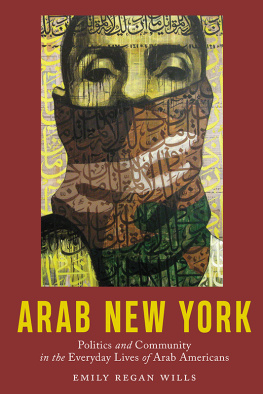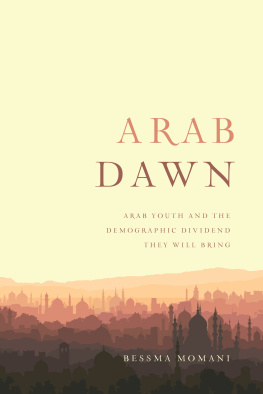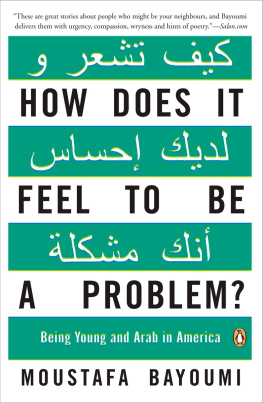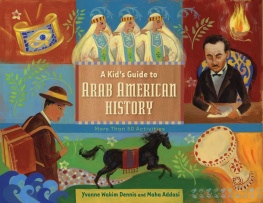History of Arab Americans
History of Arab Americans
Exploring Diverse Roots
Aminah Al-Deen

Copyright 2019 by ABC-CLIO, LLC
All rights reserved. No part of this publication may be reproduced, stored in a retrieval system, or transmitted, in any form or by any means, electronic, mechanical, photocopying, recording, or otherwise, except for the inclusion of brief quotations in a review, without prior permission in writing from the publisher.
Library of Congress Cataloging-in-Publication Data
Names: Al-Deen, Aminah, author.
Title: History of Arab Americans : exploring diverse roots / Aminah Al-Deen.
Description: Santa Barbara, California : Greenwood, An Imprint of ABC-CLIO, LLC, 2019. | Includes bibliographical references and index.
Identifiers: LCCN 2018032076 | ISBN 9781440840692 (eBook) | ISBN 9781440840685 (cloth : alk. paper)
Subjects: LCSH: Arab AmericansHistory.
Classification: LCC E184.A65 A42 2019 | DDC 305.892/7073dc23
LC record available at https://lccn.loc.gov/2018032076
ISBN: 978-1-4408-4068-5 (print)
978-1-4408-4069-2 (ebook)
23 22 21 20 19 1 2 3 4 5
This book is also available as an eBook.
Greenwood
An Imprint of ABC-CLIO, LLC
ABC-CLIO, LLC
130 Cremona Drive, P.O. Box 1911
Santa Barbara, California 93116-1911
www.abc-clio.com
This book is printed on acid-free paper 
Manufactured in the United States of America
To the wonderful grandkidsJennah, Nasir, Ruby, Yaeli, and
Toussaint. May you read this one day.
Contents
Introduction
Why is a history of Arab Americans important? Today in the 21st century, one description of who they are (terrorists or potential terrorists) and another description of when they came (in the latter part of the 20th century) dominate. Both of these descriptors are patently wrong. This text will explore Arab American culture, what influenced Arabs to come to the United States before and after it became a nation, and their immigrant and citizen experiences in the 20th century. The text will also explore their presence in various media and after the events of September 11, 2001.
Who are Arabs, as distinct from others living in the Middle East? They are first mentioned in the mid-ninth century BCE as a tribal people dwelling on the land that came to be called the central Arabian Peninsula. They were under the loose governance of a series of empires, including the Roman and Sassanian Empires. Further description of Arabs, however, requires a distinction between religious, geographic, cultural, and linguistic definitions.
The Religious Definition
Islamic tradition holds that Arabs are the descendants of Ishmael, son of Abraham, but one must then account for Arab Christians and Jews who do not hold Ishmael in their lineage. Jews are the descendants of Abrahams other son, Isaac, so Arab Jews and Muslims are considered cousins. Christians are not Abrahams descendants by blood but inherited portions of the Jewish tradition through Jesus Christ, who is seen as a rabbi.
The Geographic Definition
If the definition of who is Arab is purely by location, researchers are on much safer ground. An Arab is one descended from those who lived in a certain place in recorded history. This text uses a geographical approach, since the values and moral norms predominating in the region transcend religious traditions.
Is there one Arab culture, given the diversity of 22 countries? Is there really an Arab world? And is Arab culture monolithic? Geographically, what is called the Arab world is mostly uninhabited desert. For comparison, the Sudan is larger than Western Europe but has a 10th the population. Saudi Arabia is bigger than Texas and Alaska combined, and Egypt is 95 percent desert. The topography of the land accounts for some distinctions among countries. Natural land features, proximity to water, and differences in weather determine which animals and vegetables are plentiful. The natural features of the land also determine whether certain kinds of wood or other building materials are readily available.
The Cultural Approach: Beliefs and Values
Researchers can find information on a peoples outlook on life and how their social behavior is arranged by examining general beliefs and practices. Here, some broad generalizations in a comparative mode may be helpful to readers. Americans generally believe that the individual is an essential focal point of social existence. This, however, is mediated by the importance of relationships of individuals in families, neighborhoods, workplaces, and so on. The role of law is especially important in America because the social arrangement is predicated on rights and privileges for citizens. Citizens, for example, have the right to privacy. These beliefs and the values that derive from them provide a position from which Americans see the world.
Arab Americans, on the other hand, come from collectivist cultures where it is the family that is the central focus. They generally believe that it is not the individual who is in control of most things in life. The controlling factor is God or fate. The individual is directly tied to the family and its successes and setbacks and functions as an integral part of that family dynamic. The issues of the rights and privileges of citizens was not a subject of discussion until contemporary times, given that Arabs in most prior times lived as subjects of empire. As subjects who were in essence owned by the ruler, they had little say in government and no say in policies that affected them except for provincial rulers appointed by the government.
Arabs eat different foods and have distinctive traditional manners of dress, housing, decorative arts, and architectural styles. Their politics also differ, as do the forms of government. There are monarchies, military governments, socialist republics, and now a few countries engaging in participatory democracy. Yet, their outlook on life has some similarities that cross national borders. In general, Arab societies are conservative and demand conformity as a rule. For example, many child-rearing practices are the same regardless of country, and there is a high regard for respecting tradition. After a millennia of experience with Islam, Muslims and non-Muslims alike have been culturally influenced by the religion.
Arabs as a whole, irrespective of class, value good manners at all times. Proper etiquette, deference to elders, and a respect for social ranking are central tenets. Reputation is highly valued and must be protected at all costs. Personal preference takes a backseat to loyalty to family and tribe. Social class and family background are often on display, determining personal status rather than individual character and personal achievement. Conservative social morality must be recognized and maintained. As a result, first meetings are among individuals of status. Most other Americans would agree with this set of values but with recognition of individual choice. As in other religiously conservative communities, conservative Islamic values and beliefs determine values and other views, and ideologies such as liberalism are not welcome.
The basic definition of friendship among Arabs is like that of the Westa relationship with someone whose company is frequent, sustained over long periods of time, and enjoyable. However, to this definition Arabs add duty explicitly, while for Westerners it is expected but implicit. Friends in the Arab world must help in times of need and do favors to the best of their ability (and a little beyond). Needless to say, friends are chosen especially carefully. Requests are rarely refused in an explicit negative manner, and every attempt is made to fulfill them.
Next page













